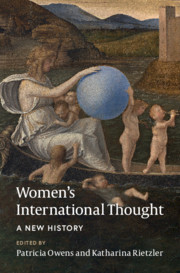Book contents
- Women’s International Thought: A New History
- Women’s International Thought: A New History
- Copyright page
- Contents
- List of Illustrations
- Contributors
- Preface and Acknowledgments
- Introduction: Toward a History of Women’s International Thought
- Part I Canonical Thinkers
- Part II Outsiders
- 5 Elizabeth Lippincott McQueen: Thinking International Peace in an Air-Minded Age
- 6 Women of the Twenty Years’ Crisis: The Women’s International League for Peace and Freedom and the Problem of Collective Security
- 7 Theorizing (with) Amy Ashwood Garvey
- 8 “The Dark Skin[ned] People of the Eastern World”: Mittie Maude Lena Gordon’s Vision of Afro-Asian Solidarity
- 9 Elizabeth Wiskemann, Scholar-Journalist, and the Study of International Relations
- Part III Thinking in or around the Academy
- Index
9 - Elizabeth Wiskemann, Scholar-Journalist, and the Study of International Relations
from Part II - Outsiders
Published online by Cambridge University Press: 07 January 2021
- Women’s International Thought: A New History
- Women’s International Thought: A New History
- Copyright page
- Contents
- List of Illustrations
- Contributors
- Preface and Acknowledgments
- Introduction: Toward a History of Women’s International Thought
- Part I Canonical Thinkers
- Part II Outsiders
- 5 Elizabeth Lippincott McQueen: Thinking International Peace in an Air-Minded Age
- 6 Women of the Twenty Years’ Crisis: The Women’s International League for Peace and Freedom and the Problem of Collective Security
- 7 Theorizing (with) Amy Ashwood Garvey
- 8 “The Dark Skin[ned] People of the Eastern World”: Mittie Maude Lena Gordon’s Vision of Afro-Asian Solidarity
- 9 Elizabeth Wiskemann, Scholar-Journalist, and the Study of International Relations
- Part III Thinking in or around the Academy
- Index
Summary
Elizabeth Wiskemann’s international thought spans the worlds of anti-fascist activism, diplomacy and academe. She produced specialist studies on Central Europe and historical syntheses for academics and general readers. She was the lead Berlin correspondent for the The New Statesman, a think tank researcher, an intelligence officer in World War II, and the Montagu Burton Chair in International Relations at the University of Edinburgh. Wiskemann’s writing was often empiricist and focused on power politics and diplomacy. She deplored British IR’s tilt towards the social sciences in the 1960s and, towards the end of her career, came to describe herself as a contemporary historian. Her trajectory underlines the importance of incorporating history and public education into disciplinary histories of IR, as well as a consistent practice orientation that sprung from a reluctance to engage in purely abstract thinking.
Keywords
- Type
- Chapter
- Information
- Women's International Thought: A New History , pp. 198 - 220Publisher: Cambridge University PressPrint publication year: 2021
- 1
- Cited by

